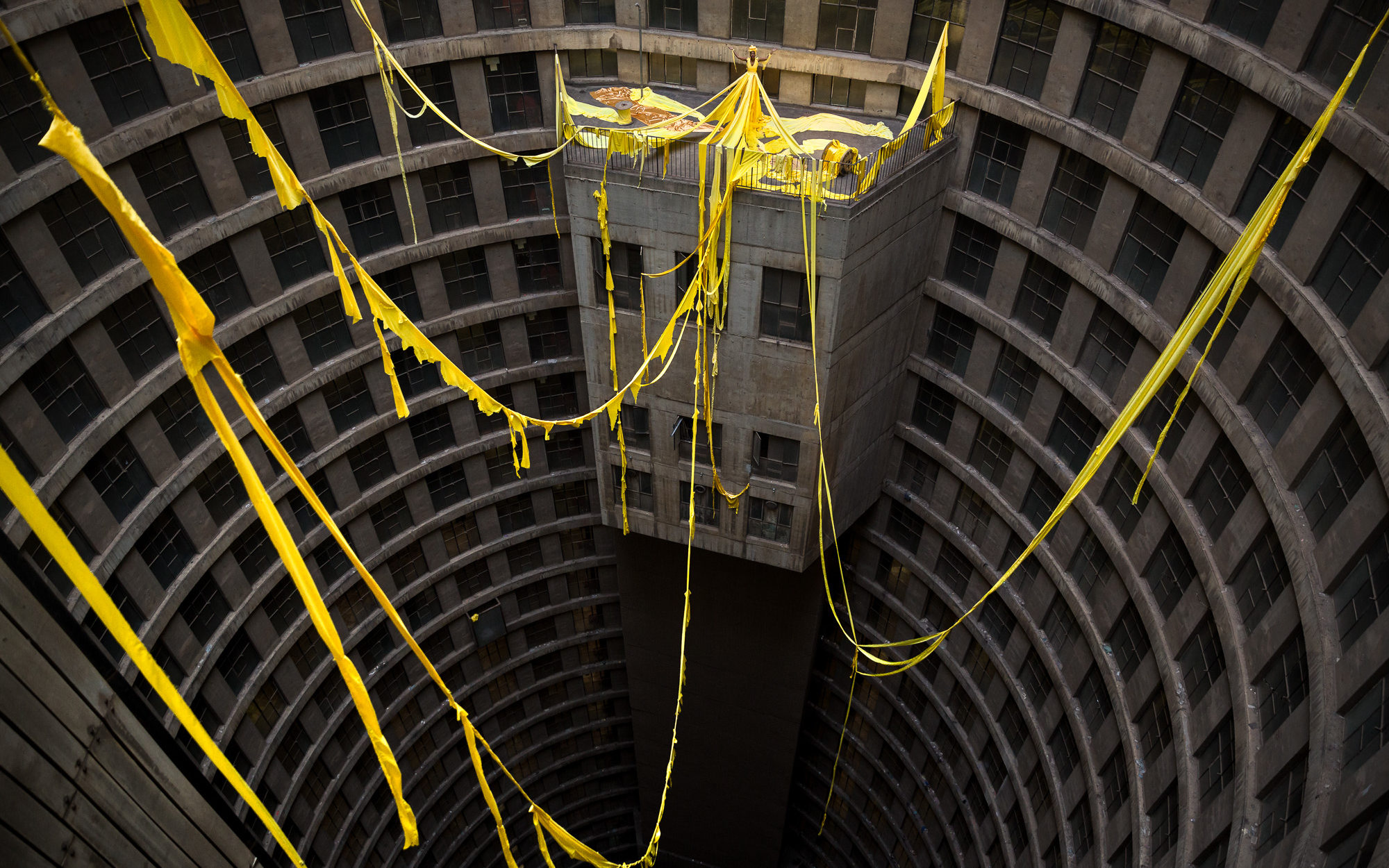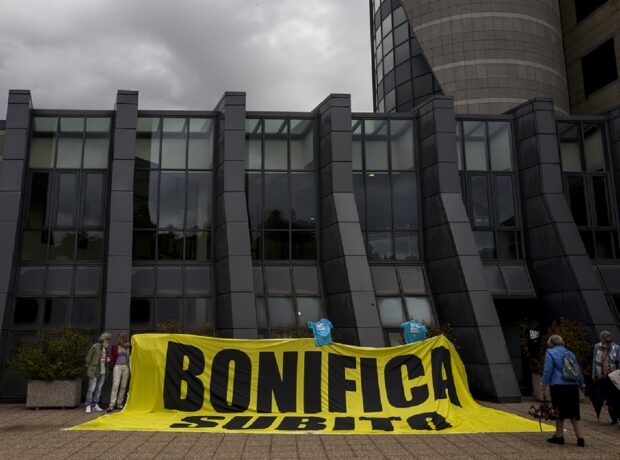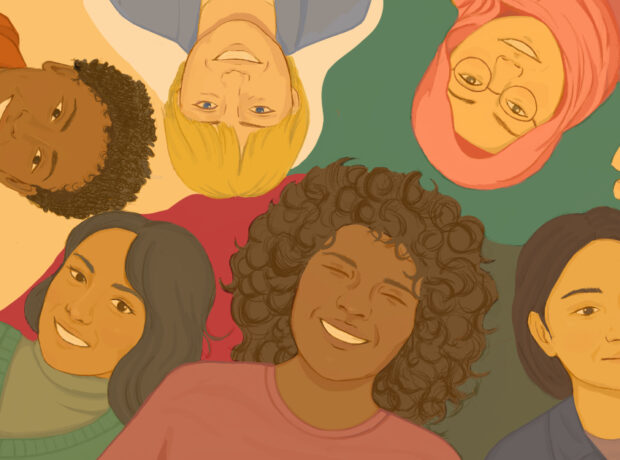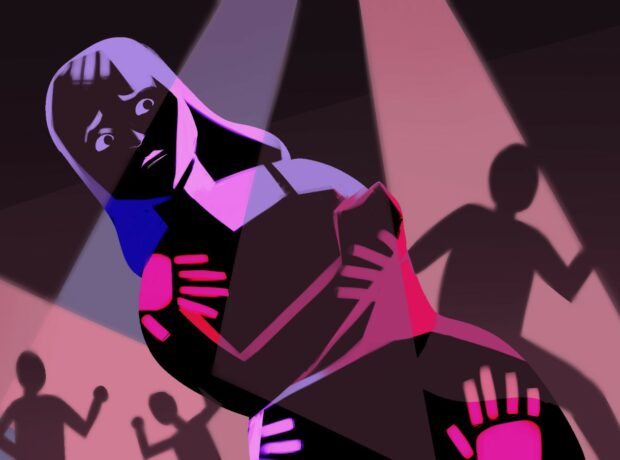Cinematographer Elisa Iannacone’s Spiral of Containment depicts the images and feelings left with survivors of sexual assault.
A woman, her bright yellow gown in tatters and her arms raised, stands at a precipice staring out over the abyss.
Shot in Johannesburg’s magnificent Ponte tower, the dreamlike image is one of a series of dramatic photographs captured by cinematographer and rape survivor Elisa Iannacone.
Launching her free exhibition in London on Thursday (International Women’s Day 2018), Elisa has travelled the world to tell the stories of 25 rape survivors, after using art therapy to process her own experience of assault.
Shocked by the statistics that one in five adults in the UK has experienced sexual violence at some point in their life, Elisa, 30, began a journey that would take her around the world, helping other survivors to share their thoughts and feelings.
She met the subjects of her photographs through rape crisis charities and through chance encounters, with photoshoots and stories coming from the UK, Mexico, South Africa, Canada, Italy, Australia, Singapore, Hong Kong and Uganda.
The stories of assault are as varied as the stories of survival, but they have all been united by the colour wheel. There are no names in the exhibition, where each participant is referred to by a colour in the spectrum.
The resulting gallery gives a glimpse into the mind of each individual, showing their darkest shadows as well as their eloquence and strength.
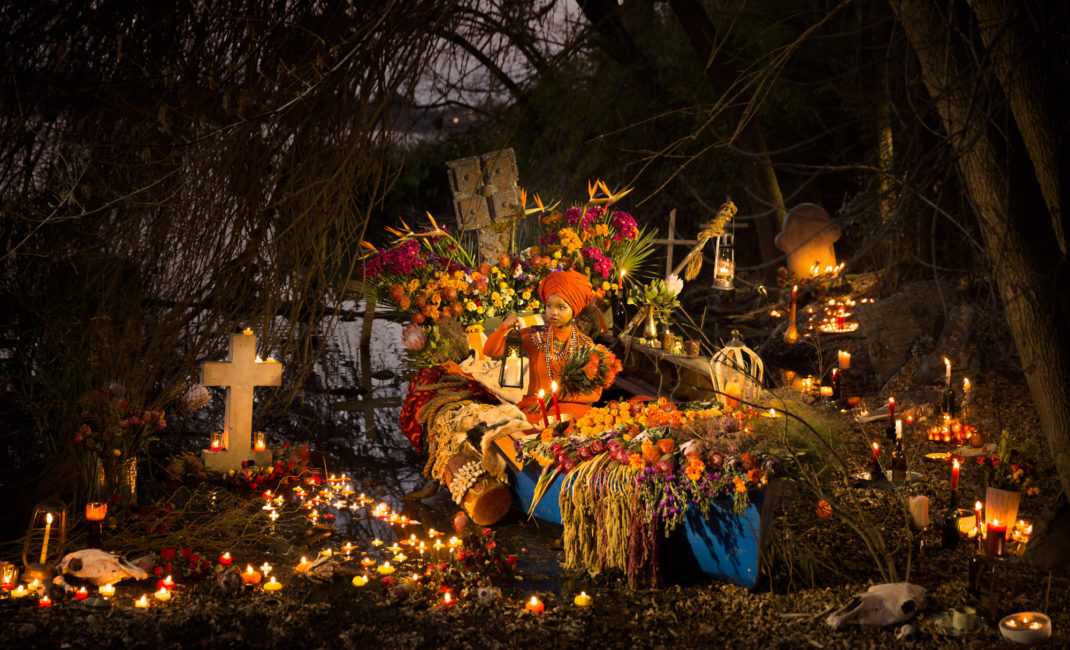
Staying Afloat – Orange. “I kept reading every tombstone that we walked past. There were
people that died in 2015 and I thought, I’m going to be one of the people that dies this year. There was no way I was going to escape. I tried to run, but he caught me.”
Elisa said: “Some people have asked ‘Why shoot beautiful images of such a horrible topic?’ But I’ve worked as a photographer in the Middle East and I know people don’t want to see harrowing pictures of dead bodies and pain. We’re completely desensitised to these journalistic images.
“Instead I want the audience to be curious and to get actively involved, asking ‘How does this relate to rape?’
“It focuses the audience on taking in the survivor’s voice – whether in print in the book or in audio at the exhibition.
“These images make you ask questions, and a lot of them have many layers that you won’t realise on first glance.”
After she was raped by a family member in Mexico, Elisa (who grew up in Mexico City but has since lived in Toronto and London) accessed support in Canada through the YWCA Breakthrough programme and the Women’s College Hospital.
Using art therapy to express her trauma, she wanted to take it further, encouraging other people to speak more openly about rape.
She said: “I realised it’s something that has happened to so many people. The statistics were astronomical, yet when it happened to me I felt like I was all on my own.
“I started to realise that each time I walked into a restaurant one out of five people in that place has experienced something similar to me. So why isn’t this something we talk about more?
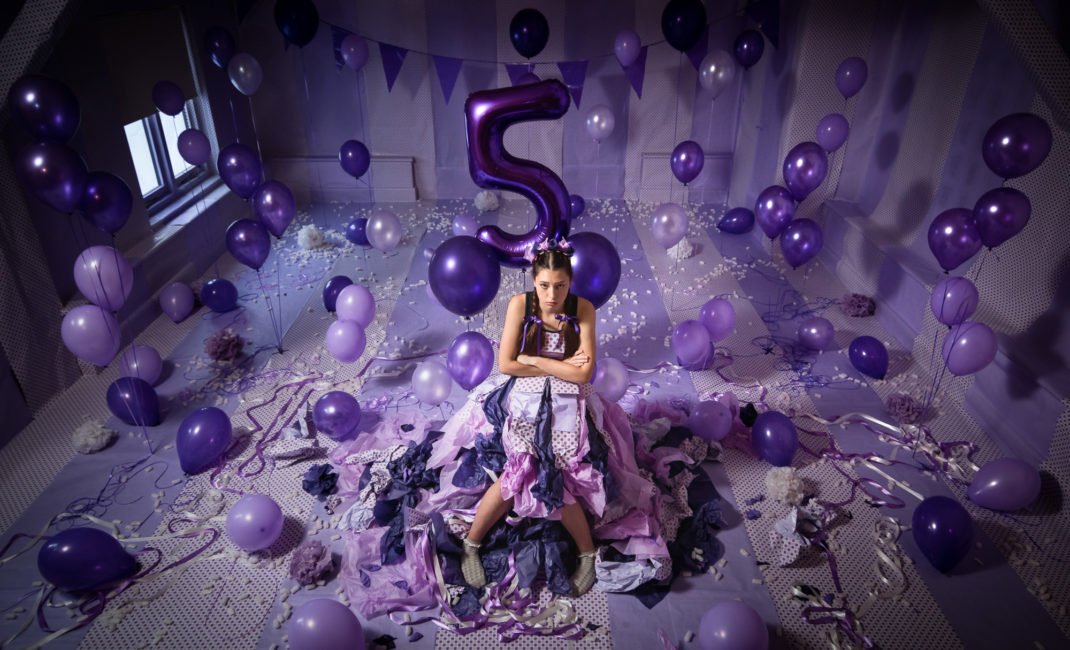
The Present – Purple. “I was 5 and he was 16. He said, ‘If you come up to my room, I’ll give you a present’.”
“As humans we struggle with sexuality. Even just regular consensual sex is a difficult topic for us to speak about, let alone sex that includes a crime and becomes linked to these ugly feelings of shame and disgust.”
Since the project’s launch, rape and sexual assault have been thrown into the spotlight by high profile cases such as Jimmy Savile and Bill Cosby, as well as the influential #MeToo and Time’s Up campaigns.
Elisa said: “When you hear about people from charities and humanitarian organisations like Oxfam being involved in abuse you might start to feel this is impossible to combat. What are we fighting for? Maybe we should just accept that this is always going to be happening.
“But all change comes with somebody daring to say ‘No, this is wrong’.”
For Elisa the hardest part of the project was launching a Kickstarter campaign to fund the work.
She said: “I was going on video saying ‘I’ve been assaulted’ and that’s going up on the internet, never to be taken down.
“There’s a fear that there will be lots of people in my life who won’t see me as anything but the raped girl. Not the cinematographer or all these other things that I am.
“Or maybe there will be people who’ll pscyhoanalyse you for it, asking ‘What led to it? Have you put yourself in a position of danger?’
“But this happened to me at home, in a completely safe environment.
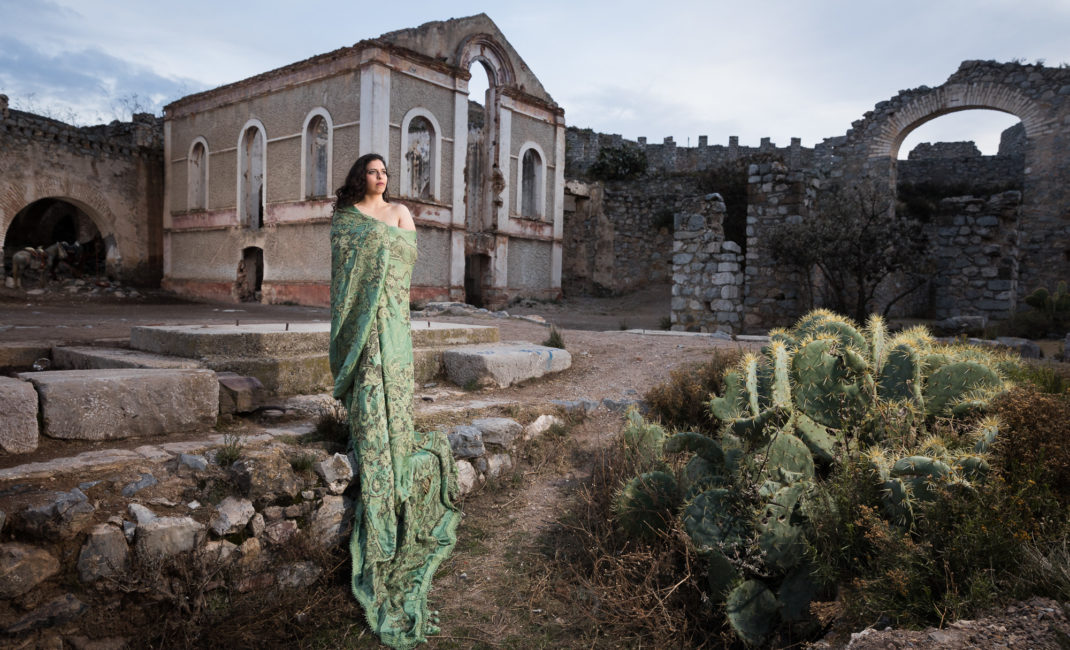
Broken Cactus – Light green. “I’m positioned as a part of the architecture that once was,
but like a cactus, all broken and punctured everywhere.
I’m still here, alive, standing, with strong thorns.”
“This also happened within my family. “Incest” is such an impossible, unpleasant word. But we can’t keep doing this. It’s never going to end if we don’t talk about it.
“There’s also the fear of ‘What if people don’t believe me?’ I was thinking about the possible backlash and how difficult things could be.
“But then I thought about this project and how much I wanted – and needed – to do it. I pushed the button and it was a massive weight off my shoulders.”
The campaign raised more than $25,000 (£18,000), allowing Elisa to begin building on the five images she had already created in the UK, scouting locations worldwide, sourcing props and finding other survivors to share their stories.
Each person in the exhibition (and book) shares their experience in their own words, with Elisa including her own story, too.
She said: “It’s given the survivors an opportunity to express themselves in a way they wouldn’t have thought of before, and in doing that they’ve connected with other people who are doing the same things. It’s created a community.
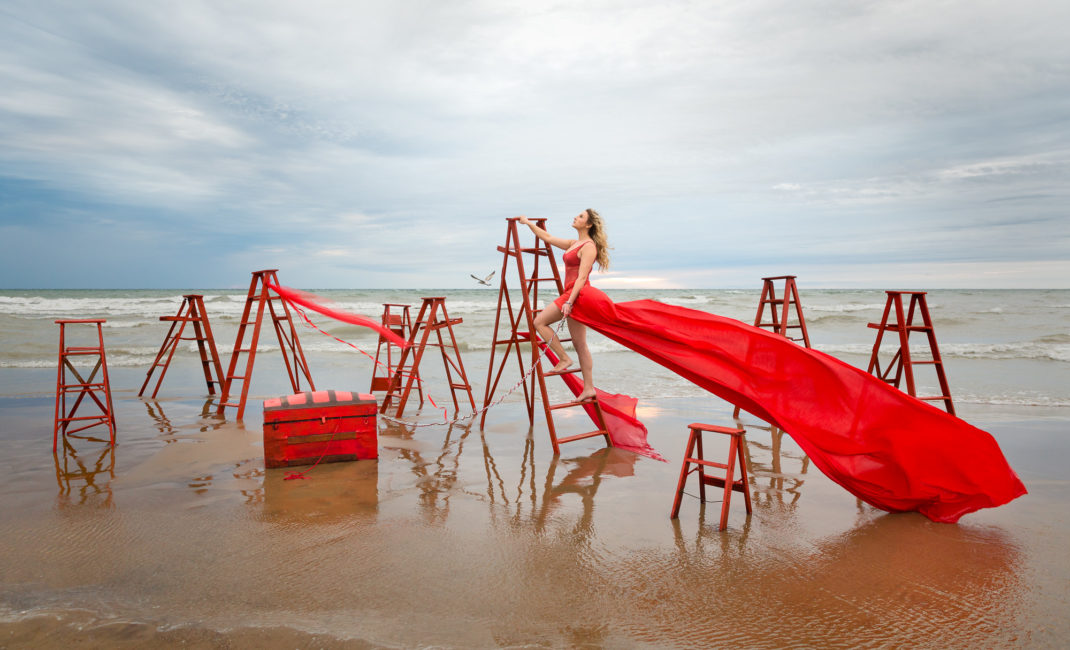
The Climb – Red. “Though everything was out of control I could still go somewhere in my mind where the pain didn’t exist.”
“Some people have said they want to hang their image in their living room because they feel so proud of it. That’s really taking hold of that experience and putting it out there.
“I couldn’t claim this ‘heals’ people. It’s not like ‘Ta da! That’s now in the past!’ But it definitely shifts people. It moves you to a different place. It’s one step further on the journey of healing.”
Elisa’s image, black and white, is the final instalment in the exhibition. She said: “I felt stripped naked, completely bare. With nothing.
“I had grown these awesome wings, building a film production company in Toronto with a friend and going on our first feature film opportunity in Mexico which we were very excited about.
“This happened when I was there and afterwards I couldn’t think, I couldn’t process. The film never got made, the wings disappeared. I just couldn’t use them any more. There was nothing left.”
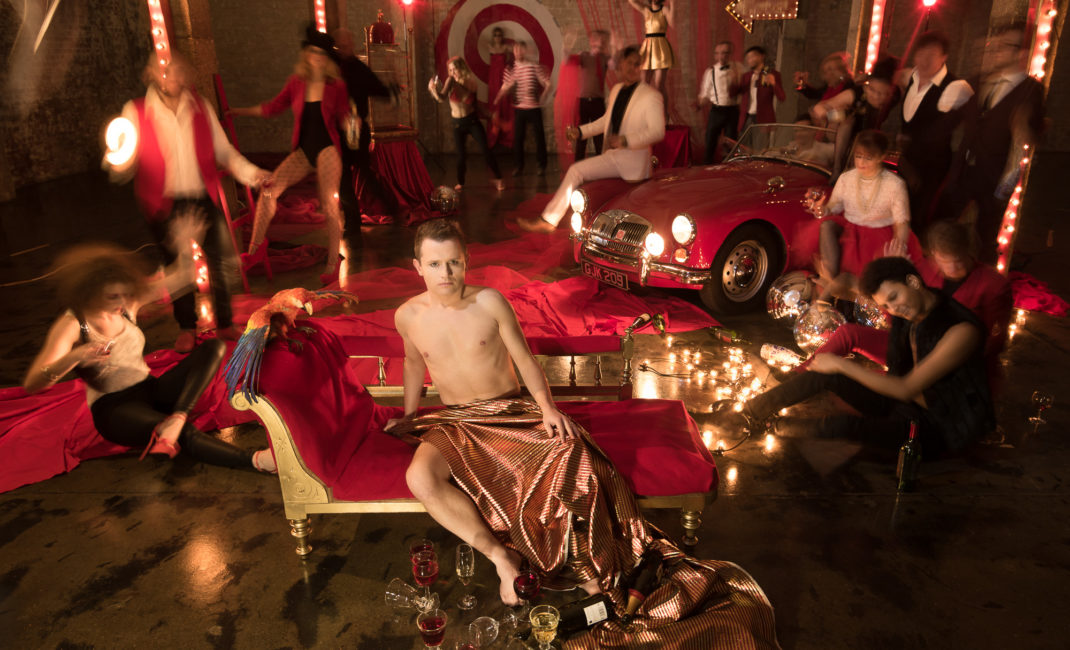
The Circus – Red. “Everything around me felt like a circus.”
She adds: “But the point is, you can get your feathers back. And this project was my way of making sure I did that.
“When people would tell me their stories I would cry with them. I’ve cried a lot.
“I couldn’t even tell you how many rape stories people have shared. People have emailed me from around the world with details of what they’ve been through.
“There’s so much shared pain – people walking around like skeletons, carrying this experience with them like their shadow and worried about other people pointing fingers.
“It’s inevitable that that shadow will always be there, but it doesn’t have a hold of my life anymore.”
The Spiral of Containment – Rape’s Aftermath is at the Oxo Tower Wharf Bargehouse from Thursday to Sunday (March 8-11, 2018) from 11am to 9pm. Entry is free.
The hardback book, featuring all 25 images and stories, plus close-up features and behind-the-scenes details, is published by Pen Words Media.
- For stories like this direct to your inbox subscribe here.
